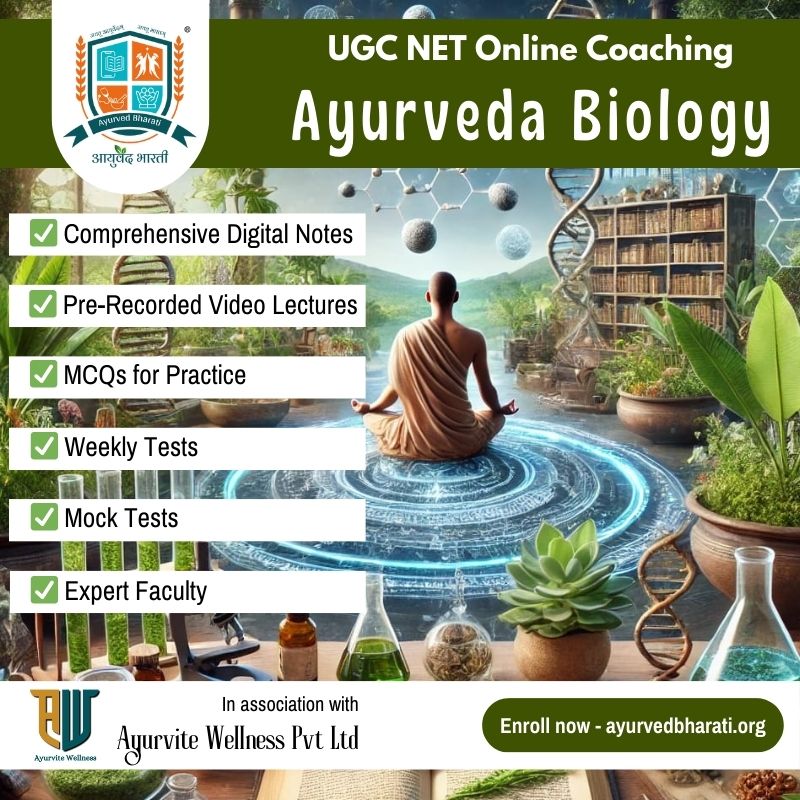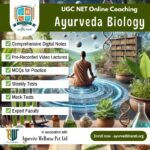Join our Online UGC NET Ayurveda Biology Coaching with Expert Guidance
The UGC NET Ayurveda Biology is a newly introduced subject starting from the December 2024 cycle. With its unique blend of Ayurveda and biology concepts, it opens new doors for aspirants aiming to excel in academia and research. To help you ace this exam, we present our online coaching program, meticulously designed to cover every aspect of the syllabus.
- Why Choose Our Coaching Program?
- Course Highlights
- Detailed Syllabus Coverage
- Unit 1: History and Development of Ayurveda
- Unit 2: Philosophy and Fundamental Principles of Ayurveda
- Unit 3: Sharira Rachna and Kriya
- Unit 4: Padartha Vijnana and Dravya Vijnana
- Unit 5: Rasa Shastra, Bheshajya Kalpana, and Ayurvedic Pharmacopeia
- Unit 6: Disease Biology, Microbiology, and Immunology
- Unit 7: Genetics, Ayurgenomics, Cell, and Molecular Biology
- Unit 8: Physiology, Biochemistry, and Nanotechnology
- Unit 9: Biodiversity, Environmental Health, IPR, and Entrepreneurship
- Unit 10: Research Methodology, Biostatistics, and Ayurveda-Informatics
- Why Start Preparing Now?
- Enroll Today for UGC NET Ayurveda Biology Coaching!
- Course Keywords:
- Frequently Asked Questions (FAQs) on UGC NET Ayurveda Biology Coaching
Why Choose Our Coaching Program?
✅ Comprehensive Downloadable Digital Notes
Access detailed and concise notes crafted by experts, ensuring clarity and ease of understanding. You can read it online, download in your device as pdf. These notes are in English.
✅ Pre-Recorded Video Lectures
Learn at your own pace with engaging video sessions that explain complex topics in simple terms. The video lectures are in Hindi (majorly).
✅ MCQs for Practice
Strengthen your preparation with an extensive collection of multiple-choice questions covering all syllabus topics.
✅ Topic wise Tests
Evaluate your progress with topic-wise assessments to identify and improve weak areas.
✅ Mock Tests
Simulate the actual exam experience with full-length mock tests designed as per the latest pattern.
Course Highlights
- Course enrollment open for: UGC NET June/ December exam
- Mode: 100% Online
- Validity: 1 year
- Medium: Video Lectures in Hindi majorly, downloadable digital notes in English, Test Series in English
- Expert Faculty: Experienced professionals with a deep understanding of Ayurveda and biology.
Detailed Syllabus Coverage
Unit 1: History and Development of Ayurveda
- Vedic origin & chronological development of Āyurveda
- Āyurveda and various schools
- Understanding and relevance of aṣṭāṅgaāyurveda
- Basic Texts and commentaries of Āyurveda
- Contribution of commentators to Āyurveda
- Introduction to bṛhattrayī and its importance
- Introduction to laghutrayī and its importance
- Basic understanding of nighaṇṭu and kośa of Āyurveda
- Contribution of contemporary publications in Āyurveda
- Government initiatives for development of Āyurveda
Unit 2: Philosophy and Fundamental Principles of Ayurveda
- āyu – lakṣaṇa, paryāya, paribhāṣā and pramāṇa
- Definitions of śarīra, jñānendriya, karmendriya, mana, buddhi, citta, ahaṃkāra, ātmā
- lokapuruṣa sāmya siddhānta, ekadhātu puruṣa, ṣaḍdhātuja puruṣa, caturviṃśati
- tatvātmaka puruṣa and their relevance
- Definitions of Ayurveda – hitāyu – ahitāyu, sukhāyu – dukhāyu, trisūtra āyurveda – hetu-
- liṅga-auṣadha-jñāna svastha ātura
- svāsthya lakṣaṇa – – Dimensions of Health Corresponding to nature, prakṛti, ṛtucaryā,
- dinacaryā, svasthavṛtta
- paṃcamahābhūta – ākāśa-vāyu-agni-jala-pṛthvī and their specific properties
- Theories of sāmānya and viśeṣa
- padārtha – theories of dravya-guṇa-karma-sāmānya-viśeṣa-samavāya
- doṣa – śarīrika and mānasika
- Introduction to dhātu, mala, agni and srotas
Unit 3: Sharira Rachna and Kriya
- Introduction to śarīra racanā kriyā
- garbhaśarīra (fetal development) – śukra, ārtava, garbhādhāna, garbha and
- māsānumāsika garbha
- Introduction to śarīra pramāṇa, saṃkhyā śarīra, aṅga-pratyaṅga-koṣṭhāṅga and āśaya
- Introduction to deha prakṛti and mānasa prakṛti
- Introduction to doṣa, sapta dhātu and mala vijñāna
- Definition and types of – asthi, sandhi, snāyu, peśī, parva and kaṇḍarā
- Definition, types and numbers of srotas, dhamanī, śirā and nāḍī
- ojas and its importance
- Definition of agni and types – jaṭharāgni, dhātvāgni and bhūtāgni
- marma – Definition and types
Unit 4: Padartha Vijnana and Dravya Vijnana
- padārtha – Definition and types – saptapadārtha
- Definition and types of pramā, prameya, pramātā, pramāṇa and pramāṇa catuṣṭaya
- pramāṇa – Definition and types – āptopadeśa, pratyakṣa, anumāna and yukti pramāṇa
- Origin of dravya, Definition and types – kāraṇa and kārya dravya
- auṣadha and āhāra dravya, āyuṣya – anāyuṣya dravya
- Basic concept of rasa pañcaka
- dravya – nāma-rūpa-guṇa-karma-yoga-prayoga-saṃyoga vijñāna
- Basic concept, classification, and application guṇa, vīrya and vipāka
- Basic concept of karma and its classification
- dravya in accordance with karma and its uses in health and disease
Unit 5: Rasa Shastra, Bheshajya Kalpana, and Ayurvedic Pharmacopeia
- Rasa Shastra and bhaiṣajyaKalpana:
- Origin and Development of rasa śāstra and bhaiṣajya kalpanā
- rasa – Definition, Types of rasa śodhana prakāra and saṃskāra
- uparasa sādhāraṇa rasa, ratna, and uparatna, – Definition; Types of śodhana and māraṇa
- Principles of auṣadha nirmāṇa, jāraṇa, māraṇa, satvapātana, nirvāpa and āvāpa
- Basic concept of bhaiṣajya kalpanā
- rasaśālā – Conventional and Contemporary aspects, Good Collection Practices and
- Good Manufacturing Practices
- Basic Pharmaceutical dosage forms and Secondary dosage forms of āyurveda
- Definition of puṭa, its types and use in various pharmaceutical forms
- auṣadha sevana kāla and auṣadha sevana mārga
- Pharmacopeia:
- Āyurvedic Pharmacopoeia of India (API) – Introduction, development and importance
- Āyurvedic Formulary of India (AFI) – Introduction, development and importance
- Drugs and Cosmetics Act, 1940 in relation to ASU Drugs and Standardization of ASU drugs
- Extra-pharmacopoeial drugs (Anukta dravya) not finding place in Ayurvedic Classics
- Knowledge of pharmaco-vigilance in Āyurveda and conventional system of medicine
- Pharmacogenomics of active compounds of Āyurveda and multi-omics approach
Unit 6: Disease Biology, Microbiology, and Immunology
- Disease Biology:
- Definition of disease, Etiology and Pathology
- Congenital and Acquired diseases
- Communicable and Non-communicable diseases
- Genetic and Epigenetic factors in health and diseases
- Autoimmune diseases and Lifestyle disorders
- Deficiency and Metabolic diseases
- Psychological disorders
- Benign tumors and various types of cancers
- Microbiology:
- Historical perspectives of Microbiology, Immunization, Epidemics and Pandemics
- Antimicrobial resistance, Immune response by microorganisms, Sterilization and disinfection
- Microbial Diversity and Physiology
- Gut-Brain axis (GBA) and Microbiome
- Microorganisms isolation and characterization, culture media
- Environmental microflora, Bio-remediation, Dairy microbiology, Indicator organisms andtests and water borne diseases
- Genetic Recombination, Transformation, Conjugation and Transduction
- Immunology:
- Role of RBCs, WBCs, platelets and plasma proteins in immune mechanisms
- Biophysics of Immune System, Structure of antigen and antibody molecules, Antigen recognition by T cell and B cells, B-cell receptors, TCR gene rearrangement, antigen presentation and MHC/HLA complex
- Antigen antibody reactions, Innate immune cells, Pathogen-associated molecular pattern (PAMP), Pathogen recognition receptors (PRR) and Complement system
- Natural and Acquired immunity, cell-mediated immunity and toxicity and cytokines
- Immunopathology and autoimmune diseases, transplant rejection and allergy, Immunomodulators
- Antibody isolation and purification, ELISA, immunoblotting, immunohistochemistry, immunoprecipitation, immune cell isolation, flow cytometry and Immunotherapy
- History of vaccines, attenuated vaccine, heat-killed vaccine, subunit vaccine, recombinant vaccine, DNA vaccine, RNA vaccine, dendritic cell-based vaccine, Virus-Like Particles, adjuvants and their role in vaccine
Unit 7: Genetics, Ayurgenomics, Cell, and Molecular Biology
- Genetics and Ayurgenomics:
- Principles of Inheritance and Variation, Historical Perspectives of Genetics
- Human genome and its evolution
- Exploring genotype to phenotype correlation, Multi-OMIC and its correlation with doṣa-prakṛti and medicinal plants
- Basics of human genomics, regulatory mechanisms of genetic variation, its role inhealth, diseases and adaptation including drug response
- Population genomics, Disease genomics, Pharmaco-genomics, Nutrigenomics, and scientific approaches and initiatives towards discovery of biomarkers
- Approach, limitation and challenges in discovery, development and delivery of P4 and P5 (Predictive, Preventive, Personalized, Participatory and Promotive) medicinal aspects of Āyurveda
- Cell and Molecular Biology:
- Plant and animal cells – Structure and Function
- Early evidences and Experiments of DNA as the genetic material, Chemistry of Nucleic acids, Nucleotides, Chargaff’s rule
- Watson-Crick model and forms of DNA; types of RNAs, Concept of gene and genome, difference between prokaryotes and eukaryotic genes, C-value paradox, Triplexes, quadruplexes and aptamers
- DNA replication-conservative, semi-conservative and dispersive models, DNA replicative enzymes and mechanisms of DNA replication
- Types of gene mutations – base substitution, frame shift mutation, insertion, deletion, missense, nonsense, reverse, suppressor and lethal mutations; DNA damage and repair mechanisms
- Gene expression and regulation in prokaryotes, structure of prokaryotic gene, structure and functions of RNA polymerase and its subunits
- Mechanism of Gene Transcription and Translation, Genetic code, Gene structure, expression and regulation in eukaryotes, RNA polymerases, Post-transcriptional modifications and Operon concept
- Basic concepts of Genetic Engineering and Biotechnology
Unit 8: Physiology, Biochemistry, and Nanotechnology
- Physiology:
- Fundamentals of human physiology and cellular function
- Digestive System – Digestion, Absorption and Metabolism
- Respiratory and Circulatory Systems – Breathing and exchange of gases, Body fluids and circulation
- Nervous Systems – Central and Autonomic nervous system, Neurophysiology and Cerebrospinal fluids
- Excretory and Endocrine Systems – Excretory products and their elimination from the body, acid-base regulation, Endocrine glands and Hormonal functions
- Reproductive System – Human reproductive physiology and Embryonic development
- Voluntary and Involuntary movements and their coordination
- Biochemistry:
- Concept of atoms and molecules, molecular interactions, stereochemistry and their importance in biological systems
- Carbohydrate chemistry and metabolism, Disorders associated with carbohydrate metabolism
- Lipid chemistry and metabolism, Disorders associated with lipid metabolism, Lipidomics
- Chemistry and metabolism of Proteins and Amino acids, Ramachandran plot, primary, secondary, tertiary and quaternary structure of proteins, Mechanisms and specificity of
- Enzymes, Coenzymes and Cofactors, Disorders associated with protein and amino acid metabolism, proteomics
- Heme synthesis and disorders
- Structure, function and metabolisms of nucleic acids, DNA and RNA
- Nanotechnology:
- Physical properties and types of the nanoparticles, Nanoparticles of various basic pharmaceutical forms of Āyurveda and Green nanotechnology
- Synthesis of nanomaterials using different methods, Molecular basis of biosynthesis of nanomaterials, assessment of plant, animal and mineral-based drugs for nanomaterials
- Characterizations of nanoparticles – transmission electron microscope (TEM), scanning electron microscope (SEM), fluroscence microscopy, atomic force microscope (AFM), Energy-dispersive X-ray spectroscopy (EDX), UV – visible absorption; photoluminescence; Fourier-transform infrared spectroscopy (FTIR), Atomic absorption spectroscopy (AAS) and dynamic light scattering spectroscopy (DLS)
- Nanomaterials in bio-sensors and other applications and Interaction of nanomaterials
- Molecular basis of nano-formulations
Unit 9: Biodiversity, Environmental Health, IPR, and Entrepreneurship
- Biodiversity and Environmental Health:
- Biodiversity of Medicinal plants and animals, Concept and Practices of environmental health, Pathways for synthesis of primary and secondary metabolites and their uses
- Pharmacological properties of secondary and active metabolites of medicinal plants used in Āyurveda
- Concept of ecosystem, structure, function and types of ecosystem, energy flow in an ecosystem: food chain, food web and ecological succession
- Biodiversity and its conservation, Levels of biological diversity, biogeography zones of
- India, biodiversity patterns and global biodiversity hot spots, India as a mega-biodiversity nation
- Renewable and non-renewable biological resources and their importance in longevity of life
- Degradation of biodiversity, loss of medicinal plants and animal life, and its impact on indigenous knowledge
- Intellectual Property Rights (IPR):
- Concept, meaning and types of Intellectual Property (IP), Origin, nature, philosophy and importance of Intellectual Property Rights (IPR), Current Best Practices (CBP) and legal framework of IPR
- Protection of Traditional Knowledge System (TKS), prevention of bio-piracy and bio- prospecting, benefits to national economy, conservation of environment, protection of livelihood of TK stake- holders, TKS and innovation in Indian medicine system
- Introduction to the Indian patent office and National Biodiversity Authority and their role in the protection of TKS, Different types of IPR protection in India, Indian Legislations –
- Patents Act of India (1970); Biological Diversity Act (2002), Convention of Biological
- Diversity (1992), Plant Protection Variety and Farmers Rights Act (2001) and
- Geographical Indication Act 1999 etc. with respect to TKS
- The role of databases and registers in the legal protection of TKS – Traditional
- Knowledge Digital Library (TKDL) through World Intellectual Property Organisation (WIPO)
- WTO, TRIPS, World Intellectual Property Organisation (WIPO), Convention on Biological Diversity (CBD); FAO; Nagoya Protocol on access and benefit-sharing
- Entrepreneurship:
- Definition of Entrepreneur, Entrepreneurial traits, and Entrepreneur versus Manager, Entrepreneurial decision processes, Ethical, Legal and Socio-cultural responsibilities
- Opportunities for Entrepreneurs in relation to food and drugs of Ayurveda for wellness
- Innovations and new ideas in Āyurveda R&D, Product planning, development and troubleshooting, Types of Āyurveda industries and manufacturing, and Competitive dynamics between the sub-industries
- Entrepreneurship development programs of public and private agencies (MSME, Ministry of Ayush, Make in India), Challenges in Āyurveda industry and decision-making, Patenting and Commercialization strategies
- Laboratory to market – strategies and processes of negotiation with financiers, government and regulatory authorities, Pricing strategy, challenges in marketing in Āyurveda business, Distribution channels, supply chain, Analysis and management of customer needs
- Business preparation including statutory and legal requirements, business feasibility study, Financial management in capital procurement and cost management, Collaborations and partnership
Unit 10: Research Methodology, Biostatistics, and Ayurveda-Informatics
- Research Methodology
- Research Methodologies and Bioethics in Āyurveda
- Fundamental principles-based research in Āyurveda
- Food and drug-based research in Ayurveda
- Pre-clinical and Clinical trials – types, protocol designing and data management in accordance with the principles of Āyurveda.
- Various extraction methods of plant materials, Concept of polarity for extraction and Solvents used for the extraction
- Purification of bioactive compounds through various chromatographic methods
- Identification of Functional Groups in Phytochemicals
- Biostatistics:
- Average, Mean, Mode, Median; Descriptive statistics, Various Statistical tests of significance and Analysis of variance
- Power and sample size calculation and Basic Principles of Statistical Inference
- Correlation analysis, Regression analysis and Survival analysis
- Genome Mapping Statistics and Bioinformatics
- Types of data and its classification, multi-dimensional data, big data, meta data, linear algebraic treatment to data, matrices, eigen values and eigenvectors, and singular value decomposition.
- Exploratory data analysis, descriptive statistics and inferential statistics
- Ayurveda-informatics:
- Chronological Development of Āyurvedic drug manufacturing industries
- Government policies and initiatives for the development of Āyurveda as traditional System of Medicine of India for the wellbeing of the world
- Ordinance, Rules and Regulations in the manufacturing of quality, safety and efficacy of Āyurvedic drugs for the consumers
- Review of important modern works on classical medicinal plants published by Ministry of AYUSH and ICMR, Govt of India Important organizations of Ayurveda – National Commission for Indian System of Medicine (NCISM), Central Council for Research in Āyurvedic Sciences (CCRAS), Āyurvedic Pharmacopeia commission, National Medicinal Plants Board and Traditional Knowledge Digital Library (TKDL), etc
- Research publication portals in Āyurveda and contemporary medical science – DHARA, PubMed, Ayush Research Portal, Bioinformatics Centre and Research Management Informatic System
- Use of modern technology to confirm the various fundamental principles, drug research and development for communicable and non-communicable diseases
- Health informatics in Āyurveda in present global scenario
Why Start Preparing Now?
With Ayurveda Biology being a new addition to the UGC NET syllabus, early preparation gives you a competitive edge. Our course ensures comprehensive coverage of all topics, empowering you to excel in this exam.
Enroll Today for UGC NET Ayurveda Biology Coaching!
🚀 Steps to Enroll:
- Visit our website and sign up for the UGC NET Ayurveda Biology course.
- Choose your preferred payment plan.
- Gain instant access to course materials and start your preparation journey.
📞 Need Assistance?
Please feel free to contact our helpdesk for any queries.
Course Keywords:
- UGC NET Ayurveda Biology Coaching
- Online UGC NET Coaching for Ayurveda Biology
- Best Coaching for UGC NET Ayurveda Biology
- UGC NET Preparation
- UGC NET Ayurveda Biology Study Material
- UGC NET Ayurveda Biology Notes
- Ayurveda Biology Question Paper
Frequently Asked Questions (FAQs) on UGC NET Ayurveda Biology Coaching
Prepare with the best and stay ahead in the competition! Join now and make your mark in UGC NET Ayurveda Biology.
This course is prepared with the support of technical experts from Ayurvite Wellness Pvt Ltd.







